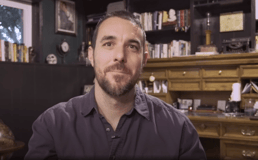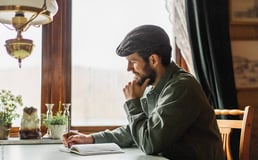What It Means to Live Without Fear
When he was elected pope in the fall of 1978, Pope St. John Paul II came out on the balcony over St. Peter’s square and the first thing he said to the whole world was, “Be not afraid!”
It’s a simple phrase, but it meant something real coming from a man who resisted the Nazi regime as a teenager, who watched Communism brutalize his people as an archbishop. Most of all, this message meant something because he embodied it, himself — he had learned to live without fear.
We face our own dangers and threats today, but the fear that coils around our necks feels the same up and down the generations — it’s part of the human condition, and it’s paralyzing. So how did he do it — how did he live without fear, given the potentially world-ending crises he witnessed? And how could he proclaim with confidence that we don’t need to be afraid, either?
Let’s look at one story from a time when he was 19 years old.
In the fall of 1939, the Nazis invaded and occupied Poland. They suspended all cultural activities and religious training. Karol Wojtyla (which was the pope’s name before he became the pope) was just 19 at the time, and loved the theater. So he continued to get his friends together to produce plays. It was an act of resistance — they gathered in living rooms with no sets, only their lines, as Nazi trucks spouted propaganda on the streets below. They could have been arrested, even killed, for these productions. Yet he was not afraid — why?
Because he was tuned in to something louder than the threat that was shouting at him. He saw the dignity of every single human person — a truth that stood in fundamental opposition to the values that drove the Nazi war machine — and decided to fight for that.
Instead of reacting to the war machine and running away, he found something to run toward, and that gave him purpose and clarity. In a time of uncertainty, when everyone was picking a side to get ahead or even just to survive, young Karol found a truth deeper than the times he was living in. In committing to it, he found strength and courage to proclaim it.
Here’s another story — this one is about what he lost before he entered the seminary.
Karol’s mother died when he was just 8. He had an older sister who died before he was born. He had a brother, Edmund, older by 13 years, who became a doctor, but he died serving people sick with scarlet fever. Then Karol’s father died of a heart attack. So by the time he was 21, young Karol was an orphan — every person he loved was dead.
And yet, Karol knocked on the door of the bishop’s palace in Krakow and asked to begin studying for the priesthood. The loss he’d suffered didn’t turn him inward to self-pity — it had the opposite effect, in fact. He wanted to pour himself out for others. And because religious training was outlawed, he had to join an underground seminary. Again, he could have been arrested or even killed. Yet he was not afraid — why?
Yes, he’d lost his family — but he hadn’t lost the love and affection they’d given him. He decided to follow that, instead of letting the Nazis control the shape of his heart. In a culture of hatred and suspicion, that love gave him strength and courage to commit himself to loving and serving others. In a time when one’s relationships and networks of concern were getting smaller, he was interested in making them bigger — even if it cost him his life.
Let’s just stand back for a moment and put a few facts together, because it’s one thing to rattle off what he did, and it’s another to read between the lines to see what it took to do what he did:
Fact one: As a young man, his whole family had died of sudden and tragic health disasters. He was alone in this world.
Fact two: His country had been overrun by Nazis, a regime built on denying the fundamental dignity of the human person in order to expand the power of the state. This regime was oppressive and opposed to any cultural or religious expressions of truth that might threaten its ideology.
So what solid ground did he have to stand on? He must have felt like the world was crumbling below him. I know if I were in his shoes, I’d be afraid. I’d feel defensive and lonely and small.
Yet he had some kind of inner strength — some kind of spark that wasn’t dimmed by what happened outside of him. It seemed to only grow brighter the darker the world became.
That spark gave him something to fight for — it gave him a different way to see the world, different tools to use in the battle. The Nazis used force and expected resisters to use the same weapons, but Karol was playing a different game. He refused to pick up a gun, and instead picked up the arts and acts of service because he knew that the real battle was being fought over minds and hearts.
So what was his secret? Where did he find that spark?
Karol was not afraid because his deepest identity was rooted in God — not in being a Pope; not even in being son of Emilia or brother to Edmund. He was a son of God, and he knew it, and that identity gave him the interior resources to not withdraw when the truth and his life were endangered, but to go out instead. He went out to love and serve others with beauty and truth.
We should look at one final story of how John Paul II lived without fear — this one coming from the end of his life.
From the time he was a child, Karol loved being active and physical. The theater was one manifestation of this kind of physical expression, but he also loved sports. He played goalie in soccer. He climbed mountains. He skied. He hiked and camped and kayaked. As a young man, he was hit by moving vehicles three different times, sustaining serious injuries on each occasion. As pope, he trained with weights and jogged and swam. It’s like he loved having a body.
Which is what made his final illness so cruel.
After a slow decline in health, he was diagnosed with Parkinson’s disease, a long-term degenerative disorder of the central nervous system. When he reached his 80s, the man who had such expressive command of his body, who had used that body to communicate God’s love to the world, slowly lost control of his motor functions. Symptoms began to show: shaking, difficulty walking, muscle spasms, poor balance and fatigue, loss of speech. People suffering from Parkinson’s experience the humiliation of losing control of their bladders, or drooling.
This body that he loved, that allowed him to embrace the world, was betraying him.
One might expect a man so accustomed to such physical grace and dexterity to retreat from the public eye, to shore up what dignity he had left and let the disease take its toll in private. But John Paul II did not give up — he continued to travel, he continued to speak and lead.
He was unafraid — why?
Because this identity as a son of God gave him the strength to embrace vulnerability and weakness — not run from it. He didn’t shrink back in fear, even in this last stage, because his identity as a son of God kept him moving outward, toward others with the truth and beauty of the good news that we are God’s beloved children as well.
He knew that even his decline and illness — even his death — could point to God’s unfailing love. Be not afraid — John Paul II proclaimed it as his first words on the balcony when he was elected pope; he proclaimed it with his life; he proclaimed it even with his death.
Looking for more to read? Here are some suggestions.

Finding Hope in Times of Darkness
Finding hope in times of darkness is difficult, but so necessary to our happiness and attitude towards life. Hope is so often a misunderstood virtue, it’s no wonder people usually undervalue...